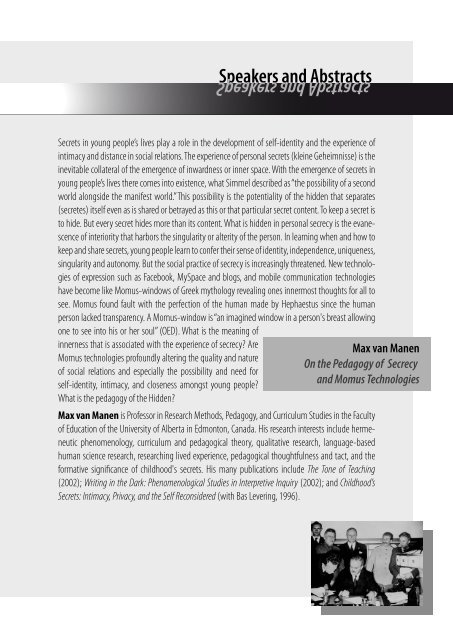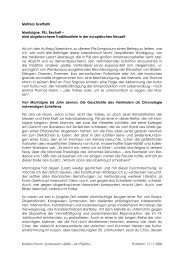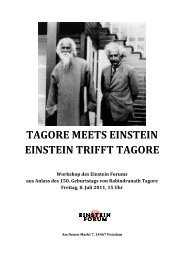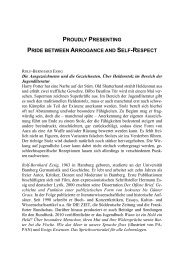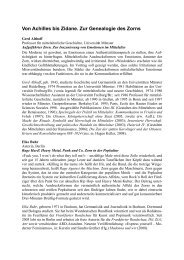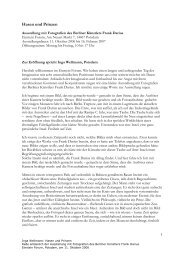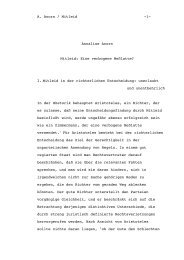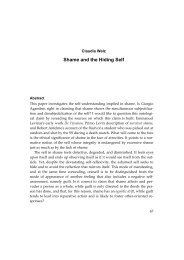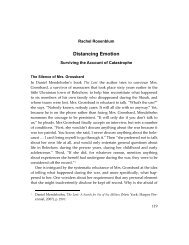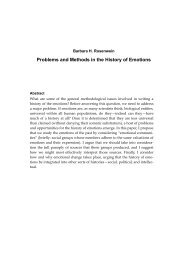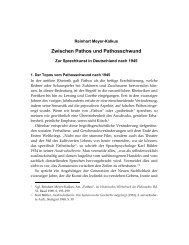Speakers and Abstracts - Einstein Forum
Speakers and Abstracts - Einstein Forum
Speakers and Abstracts - Einstein Forum
Create successful ePaper yourself
Turn your PDF publications into a flip-book with our unique Google optimized e-Paper software.
<strong>Speakers</strong> <strong>and</strong> <strong>Speakers</strong> <strong>and</strong> <strong>Abstracts</strong><br />
Secrets in young people’s lives play a role in the development of self-identity <strong>and</strong> the experience of<br />
intimacy <strong>and</strong> distance in social relations. The experience of personal secrets (kleine Geheimnisse) is the<br />
inevitable collateral of the emergence of inwardness or inner space. With the emergence of secrets in<br />
young people’s lives there comes into existence, what Simmel described as “the possibility of a second<br />
world alongside the manifest world.” This possibility is the potentiality of the hidden that separates<br />
(secretes) itself even as is shared or betrayed as this or that particular secret content. To keep a secret is<br />
to hide. But every secret hides more than its content. What is hidden in personal secrecy is the evanescence<br />
of interiority that harbors the singularity or alterity of the person. In learning when <strong>and</strong> how to<br />
keep <strong>and</strong> share secrets, young people learn to confer their sense of identity, independence, uniqueness,<br />
singularity <strong>and</strong> autonomy. But the social practice of secrecy is increasingly threatened. New technologies<br />
of expression such as Facebook, MySpace <strong>and</strong> blogs, <strong>and</strong> mobile communication technologies<br />
have become like Momus-windows of Greek mythology revealing ones innermost thoughts for all to<br />
see. Momus found fault with the perfection of the human made by Hephaestus since the human<br />
person lacked transparency. A Momus-window is “an imagined window in a person's breast allowing<br />
one to see into his or her soul” (OED). What is the meaning of<br />
innerness that is associated with the experience of secrecy? Are<br />
Momus technologies profoundly altering the quality <strong>and</strong> nature<br />
of social relations <strong>and</strong> especially the possibility <strong>and</strong> need for<br />
self-identity, intimacy, <strong>and</strong> closeness amongst young people?<br />
What is the pedagogy of the Hidden?<br />
Max van Manen<br />
On the Pedagogy of Secrecy<br />
<strong>and</strong> Momus Technologies<br />
Max van Manen is Professor in Research Methods, Pedagogy, <strong>and</strong> Curriculum Studies in the Faculty<br />
of Education of the University of Alberta in Edmonton, Canada. His research interests include hermeneutic<br />
phenomenology, curriculum <strong>and</strong> pedagogical theory, qualitative research, language-based<br />
human science research, researching lived experience, pedagogical thoughtfulness <strong>and</strong> tact, <strong>and</strong> the<br />
formative signi�cance of childhood's secrets. His many publications include The Tone of Teaching<br />
(2002); Writing in the Dark: Phenomenological Studies in Interpretive Inquiry (2002); <strong>and</strong> Childhood’s<br />
Secrets: Intimacy, Privacy, <strong>and</strong> the Self Reconsidered (with Bas Levering, 1996).


